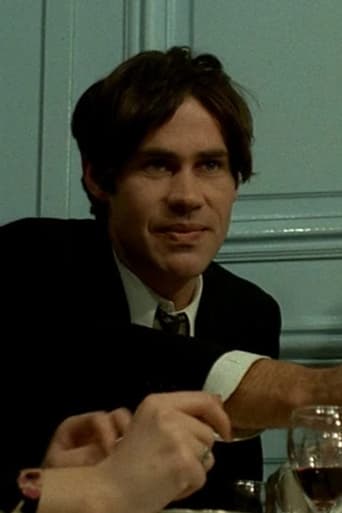Cleveronix
A different way of telling a story
Lidia Draper
Great example of an old-fashioned, pure-at-heart escapist event movie that doesn't pretend to be anything that it's not and has boat loads of fun being its own ludicrous self.
Darin
One of the film's great tricks is that, for a time, you think it will go down a rabbit hole of unrealistic glorification.
The_late_Buddy_Ryan
We first see our protagonist, Jeanne, outside a modernist high school building whose name—"Lycée Jacques Brel"—suggests an institution devoted to the study of love and longing as well as the realms of higher thought. That's what Rohmer has in mind, of course. In an extended prologue, we learn that Jeanne is at loose ends; her fiancé's out of town, she's creeped out by his messy apartment when he's not there and she's lent her own place to a country cousin who needs to stay an extra week. Natacha, a music student she meets at a party, extends an invitation. No surprise that these attractive young women talk fluently and at length about their family histories, their habits and opinions; later on, when Natacha's father, Igor, and his younger girlfriend, Eve, join in, the talk becomes even more rarefied—a casual question about Jeanne's teaching methods turns into a brief refresher course on Kant's transcendental idealism. And as usual, this talk has an undertone of intrigue and seduction; Natacha has scouted her new friend as a possible replacement for Eve, whom she despises. It takes some maneuvering and a strategic tantrum to get Igor and Jeanne alone together in his secluded country house, but there's not much at stake emotionally for either of them and not much of a payoff for them or for us. Despite a promising start, I felt that the sly, noncommittal ending makes this one of Rohmer's less satisfying (as opposed to edifying) films. Apart from the better known titles with women's names in them (Claire, Maud, Chloë (aka "Love in the Afternoon"), Pauline), I'd also rate "The Aviator's Wife," "The Good Marriage" and "Boyfriends and Girlfriends" as well as the other seasonal tales ahead of this one.
rooprect
Artistic tastes are entirely subjective, so I'll start by mentioning some of my favourite directors, and if they're your faves too, then read on. Otherwise, just skip my entire review.Robert Bresson, Krzysztof Kieslowski, Akira Kurosawa, Bela Tarr, Wim Wenders. And when he's not annoying the living crap out of me, I really like Werner Herzog.I neither liked nor disliked "Tale of Springtime" but was left feeling unfulfilled. Other reviewers have criticized this film for being "boring", "slow" and "plotless". You won't hear that from me. On the contrary, I thought the mood and pacing were perfect. The big problem: it never delivered anything worth justifying the effort of watching. And I don't mean car chases and spaceships; I mean something of philosophical value.This movie drew me in with literary and philosophical teasers implying that the film would attack the grand questions of existence. It begins with an air of mystery (no dialogue for the first 4 minutes) and a teaser about some dark unknown truth about the main character, a philosophy professor; when she finally speaks, she muses about how an invisible person--the bearer of Plato's ring of Gyges--would probably be struggling to piece together the unusual events surrounding her life. We are repeatedly given hints of her guarded secret love-life (a lover's apartment which she is afraid to visit), her violent temper which she repeatedly warns people about, discussions of Plato, Kant, transcendentalism, anything & everything indicating that some substance would follow.I felt totally cheated upon slowly realizing that the protagonist is absolutely average, her life uneventful, and the only grand philosophical question attacked is whether she should kiss her friend's father. Boo. Note to filmmakers: do NOT allude to Plato's ring of Gyges (several times) unless you plan to back it up! That's like opening a film with Beethoven's 7th Symphony, then turning the rest of the film into a campy scifi flick about sex in the 22nd century. Oh wait, John Boorman actually did that in "Zardoz".I would contrast this film against Bela Tarr's "Werckmeister Harmonies" which, similarly, follows the life of a mysterious lone protagonist & forces us to unravel his life in cryptic vignettes. As in Tale of Springtime, in Werckmeister we also get teasing doses of philosophy to pique our interest. The difference being in Werckmeister the philosophy is profound, pervasive and relevant to the story and setting, and, though painfully slow at times, Werckmeister gives the audience a powerful thought to chew on after the credits roll.This is the third Rohmer film I've seen, and I think I have to conclude that he's not for me. Elements of this film are like Kieslowski whom I adore, but this film doesn't pack the same haunting depth as, say, "Decalogue" or "Trois Couleurs". Elements of this film are like Wim Wenders whom I also adore, but here we lack the satisfying payoff and poetic closure like in "Paris, Texas", "End of Violence" or "Don't Come Knocking". In short, this film has all the style & art of Kieslowski, Wenders & the aforementioned master directors, but none of the guts.By the way, I actually liked "Zardoz"!
WilliamCKH
It may seem strange that with all the great Rohmer films to choose from, that this would be my favorite. After all, it is a slow moving film, with a threadbare plot, even by Rohmer standards, and yet completely enchants me. Jeanne, the main character, is an ordinary, middle-class woman, at the start of her career as a teacher, at the start of a relationship with Mathieu (whom we never see) still trying to figure her life out. She recognizes her own shortcomings, she thinks too much, she's not able to confide in others and she is sometimes too accommodating to people. Yet she is a noble character, with great integrity and kindness.There is a wonderful little scene in Natasha's apartment. Jeanne is grading papers in the dining room as Natasha comes home from school, and in the kitchen, the living and Natasha's bedroom are flowers Jeanne has bought to thank Natasha for her kindness. Natasha, in return, is so touched by Jeanne's act of kindness that she can barely contain herself. This one little scene shows so much. Jeanne's dedication as a teacher, her kindness to people, and flowers to herald in the first days of spring.As their situations develop, and really there is no reason to speak of the plot, there is a deepening bond as the viewer spends more time with the characters, in simple things, doing simple chores, cutting potatoes, folding clothes, listening to music, and paying attention to what is said, and not said, in their conversations, and at the end of the movie, you seem to have made some very good friends. It's a wonderful thing to be touched by art, but it is more wonderful, I think, to be touched by ordinary life and ordinary people. By not attempting to, Rohmer has made a masterpiece.
Fiona-39
This is not my favourite of the 4 Season's tales - I prefer both Autumn and Summer to this one. And it is almost a master class in deficiencies in the British education system, when the main characters can (very convincingly) argue the differences between Kantian perception over lunch, and when Jeanne, the teacher, defends philosophy at secondary school as teaching you how to live. And indeed she seems to be fine with a rather strange situation, being essentially courted by a daughter on behalf of her father (and in fact Rohmer takes up this theme again in Autumn when a woman does date someone as a proxy for her friend). It is a film that requires slow contemplation and which doesn't open up its secrets easily - rather like the location of the necklace, the Hitchcockian MacGuffin which is but a pretext for the poisonous atmosphere between the two girls and whose eventual revelation changes nothing in the basic situation.






